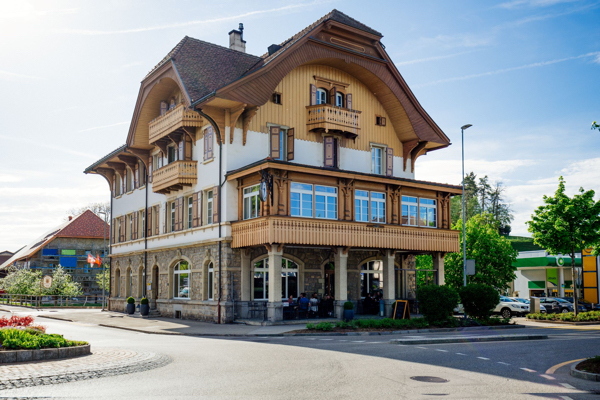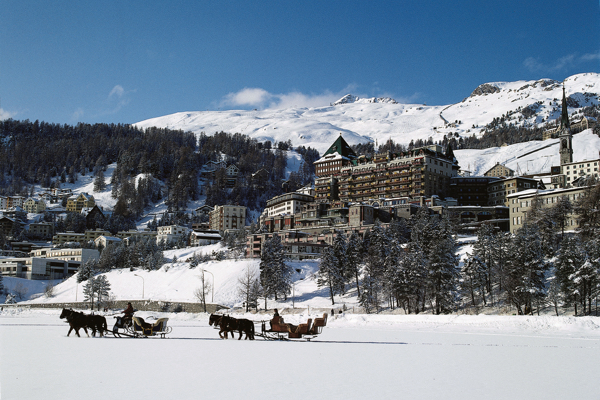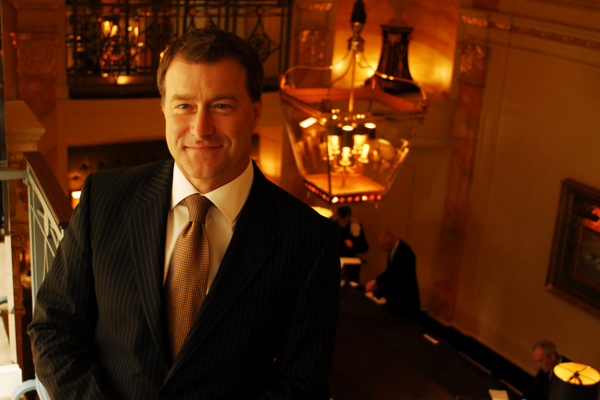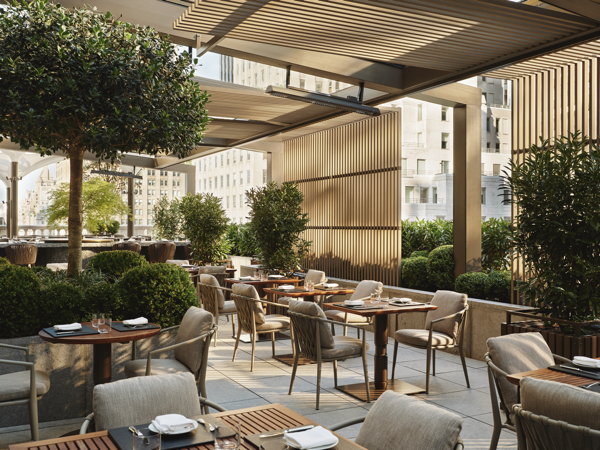The global nature of Roland Fasel’s hotel career, he said, has been a big key to his success, and his route didn’t come by accident. Early on in his career, the Swiss-born global hotelier recognized the importance of being exposed to different ownership groups and cultures, which required quick pivots on leadership styles, communication strategies and business models. In fact, he is certain that working on three continents gave him a cohesive set of leadership skills and a competitive advantage to get ahead, which eventually led him to today’s role as COO of the ultra-luxury Aman group of hotels.
What was, perhaps, more fortuitous was an early career opportunity that gave him a taste of luxury hotelkeeping, which he quickly embraced, astutely understanding that further narrowing his niche would give him a more certain trajectory.

The son of a small town, 15-room innkeeper, who first apprenticed as a chef and then studied at École hôtelière de Lausanne, received his first taste of branded luxury in 1983 when he earned an internship at the Four Seasons hotel in Ottawa, Canada. It also served to expose Fasel to organizational and cultural excellence, which he says truly opened his eyes and helped him further map out a plan that would eventually lead him to his current role and the recognition by his peers as HOTELS 2022 Corporate Hotelier of the World award winner.
Big moves, big learns
“The big moves always created a completely new level of energy – a refocusing,” Fasel explained. “That’s where my big learns came from. They were humbling, from embracing a new culture, wanting to be embraced by your new team and even opening new bank accounts. It created an incredible learning experience and another recalibration of my value system.”
Fasel, now 61, spent his first six years after graduation predominantly working in food and beverage with Four Seasons and alongside early mentors like Alfons Konrad and Nick Mutton. He also worked early on for Rosewood Hotels at the Bel-Air in Los Angeles where he met his wife and learned from the likes of legend Bob Zimmer.
In the early ‘90s, Fasel headed abroad to Bangkok, Thailand, to work with the original Regent Hotels team along with another mentor, Wolf Hengst. By 1994, he moved to Shangri-La Hotels & Resorts, where he earned his first GM’s job in Singapore. It was followed by an opportunity to turn around the then-tired Badrutt’s Palace in St Moritz, Switzerland, before heading to London to help reposition the InterContinental brand. Next came a long, eight-year stint with the Dorchester Collection where he served as general manager of The Dorchester in London and regional director for Dorchester Collection, overseeing new openings, residences, spa facilities and participating in the development of the brand.

“I’ve been through military coups in Thailand, disease in Kota Kinabalu to earthquakes and more, and I became a leader who stays very calm, very pragmatic, understanding that everybody’s looking at you to communicate properly,” Fasel explained about the value of his many global experiences. “That’s always been one of my strengths – that in situations of crises, I am able to get the teams together and follow up on processes. Over 30-plus years in this business, you can just imagine how many things we had to deal with.”
What Fasel also learned from his varied global experiences was to be transparent with communication. “I believe, ultimately, success is not one person,” he said. “I’ve always been able to bring teams together with clear and transparent communication because it helps everybody stay aligned and calm. If there’s nothing hidden people have real engagement that helps develop collective responsibility and accountability.”
“Roland is a passionate hotelier, a very strategic thinker and planner, has long-term vision, works very well with his teams at all levels, and is very well respected by his people,” said another veteran global hotelier MPS Puri, who worked with Fasel at the Bel-Air. “He sees the big picture but toils over the little details, as well, completely in touch with what is happening in the current marketplace, (NFTs, metaverse and more).”
Loving a challenge
Fasel said the other reason he made moves to Asia and London and eventually to an ultraluxury company like Aman was to stay challenged and to continue learning.
At Shangri-La, for example, he learned how to take care of a business with big volume, how to optimize revenues and reinvent himself once again. Later, at Badrutt’s Palace, he put together a new team and used a lot of creativity to reposition and reinvest to the tune of US$80 million to return to the top of the leisure market. At InterContinental, he was charged with helping to reposition the brand, which included renovating a flagship in Hyde Park (London).
And when Chris Cowdrey called from The Dorchester in 2008, he asked Fasel to help him create what is now known at the Dorchester Collection. “Throughout, it was quite the exciting time,” Fasel added.

For about the past six years, Fasel has been running Aman, reporting directly to principal Vlad Doronin. “Our minds, visions and aspirations were pretty much aligned,” Fasel said of his initial meetings with Doronin. “We both saw the potential of this brand. And if we did it right and were willing to make some of the sales and marketing changes, we knew it could be a huge success. Six years later, we have moved the needle quite substantially.”
During his time with Aman, Fasel has seen the brand grow to encompass several new hotels and resorts in unique destinations. He oversaw the opening of the brand’s fourth resort in China in 2018, Amanyangyun, and third in Japan in 2019, Aman Kyoto. He has also guided Aman into its 30th year of operation, which saw Amanpuri unveil an extensive refurbishment, including Aman’s first Holistic Wellness Centre. Fasel also directed the strategic vision for the brand’s private jet, which went into operation in 2019.
Along with the ballyhooed New York City hotel and residences opening in August 2022, Fasel is also currently developing Aman Niseko in Japan, Aman Miami, an Aman project in Saudi Arabia, Amanvari in Mexico and Aman Nai Lert Bangkok.
But perhaps the biggest challenge for Fasel was developing the New York project in the midst of the pandemic. “Anybody who wants to develop a building in New York should think long and hard about whether it’s an undertaking they want,” Fasel joked. “New York is so complex for anything from planning to licensing, labor and craftsmanship. Then add COVID on top of it… Vlad [Doronin] was instrumental as a developer and in the design of the project. But there were so many things you think you have under control as part of your circle of influence – yet there were so many things always leaking and slipping out of that circle.”
At the end of the day, Fasel said Aman came out with what is now a fantastic project in Manhattan. What remains is the continual battle for talent – getting the right people to deliver the Aman experience, which is the furthest thing from transactional.

Even more humbling, Fasel admitted, was managing the portfolio through COVID, especially on the heels of 2019 being the company’s best year to date.
“We had a big meeting in January 2020 and everybody was so pumped up,” he recalled. “And then, within three or four weeks, we started to scramble for our survival with 16 owned hotels… It makes you really humble very quickly.”
Fasel said he adjusted the company structure very early on during the pandemic and intensified all communications. “The other decision, which from a sales and marketing and pricing perspective we really got right, was the reemergence of the European and the U.S. markets and understanding that our product was what people were looking for. So, we were able to optimize whatever business came back to a greater degree than others… The recovery came back quickly, and I think it was due to communicating better, being much more agile, much more transparent and taking these positions very early on during the crisis.”
Aspirations, inspirations
What Aman is also known for to a greater degree than its competitive set is its service, and what Fasel brings to the table is more than ample experience in the ultra-luxury space.
“My aspiration is to create as many seamless experiences as possible. But ultimately, my aspiration in the ultraluxury space is to be able to individualize and personalize the service to an extraordinary level,” Fasel explained. “We have craftsmen and artisans in our business who deliver that level of detail. And for me, it’s important to create the frameworks for the people to deliver that… My philosophy is that it’s still a less scripted environment and I hire employees who have that intuitiveness and passion to deliver all these pieces. Ultimately, what you want to do with all the anticipatory, personalized, individualized service propositions is create seamlessness in the customer’s journey… Having employees who are the true craftsmen and artisans is still where I think the ultraluxury business is going.”
If Fasel has any hotel pet peeves, it would be overcomplicating processes perhaps because a company or hotel fails at some of the basics. “It’s difficult to do simple stuff right but it’s first and foremost most important,” he said. “If you cover the basics in a hotel context, I’m quite a happy guy.”
Internally, Fasel is committed to creating a purpose-driven company with clear values and brand pillars where everybody understands the goal is to create sanctuaries for guests. “I have a very detailed brand architecture established first and foremost. So, every decision then becomes much easier to make… A lot of people start with strategy; I start with purpose values and then the strategies support the purpose.”
More personally, as a leader, Fasel said he operates quite relaxed on multiple levels. “The people I usually get along with have high emotional intelligence – who have respect and understand the context they’re in, are friendly and open in their communication style.”

Fasel also said he gets along better with people who have passions outside the hotel business as he remains very curious and passionate about what is going on around him in the world. The former marathon runner who tries to lead a healthy lifestyle still runs, plays polo, roots for the Chelsea football club and sleeps properly. He said he loves his rock ‘n roll music and tries to get to shows as often as possible, sometimes with his lifelong mates from back home in Switzerland. “We still do things together, travel together,” Fasel says. “It keeps me grounded, as well.”
When asked if he’s made any mistakes during his career, Fasel said for the longest time he struggled to find work-life balance. “It took me a long time to finally understand the different stakeholders and to protect my inner circle significantly more than everybody else,” he admitted.
What changed? The rewards of having children, naturally. “When decisions were to be made between family and business, I started to make decisions for the family first, and it didn’t harm any of my progress,” Fasel said. “We’ve become quite a tight unit and it helps with everything else.”
So, what’s next to accomplish for Fasel? Growth through the next cycle, he says, with potentially new structures and approaches to the business. “That’s, again, new learnings, new investors, board meetings – all that discipline.”
But in the next breath, Fasel talked about more exploring with his family and eventually becoming a grandfather.
“It’s an absolutely brilliant business,” he added. “But it takes a certain degree of resilience and a great degree of agility. You have to stay focused, but I do believe if you are able to go through the learning years there is no limit to what you can achieve.”

